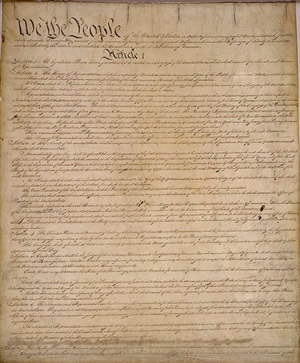This Week in History
May 26-June 1, 1787
Why the Preamble to the U.S. Constitution Matters
May 2013
 Manuscript of the U.S. Constitution. |
Two hundred twenty-six years ago, in Philadelphia, on May 25, 1787, fifty-five delegates from the thirteen American colonies came together to shape what became the longest-lasting constitution in human history. They engaged in a debate, behind closed doors, for nearly four months, before they came forth with the finished product. The result was the remarkable statement of principle, and procedure, which is known as the U.S. Constitution. In many respects, as Dr. Benjamin Franklin said when he was asked about the document, at the conclusion of the convention, this Constitution gave us our republic, "if we can keep it."
What distinguishes our Constitution from that of most others in the world is, the fact that it represents a statement of principle, in sharp contradistinction to the compendium of "do's" and "don'ts" which comprise many others. That statement of principle appears in the Preamble, which is, contrary to the judgment of many, the overriding philosophical statement, by which all other details within the document must be judged. The intention of that document must guide the implementation of each specific part, or any apparent conflict between the parts.
The Preamble itself expresses three major principles, all of which are actually inherent in any well-functioning republic.
First, the document sets forth the absolute sovereignty of the United States Federal government, in declaring the establishment of the government as an instrument of all the people of the United States. This concept is much misunderstood by populists and others, who wish to make their marks in life through rebellion against the "powers that be." It is the people of the United States, not some "outside" authority, which is establishing this government, for the purposes stated therein, and therefore it is the people who have the authority, and the responsibility, to ensure that the purposes of the government are carried out.
Second, this all-important first paragraph sets forth the principle of the general welfare of the population as the commitment of the government. Much ink, and heated debate, has arisen in response to this clause, which, in fact, was the product of earlier proposed governing documents by Benjamin Franklin and others. Even the so-called "Father of the Constitution" James Madison argued vociferously against the "general welfare" clause giving the Federal government powers to act in areas of vital economic policy. Yet, the Preamble is clear in stating that the government must operate for the general welfare of all the people—and a later clause of the Constitution repeats that intention. A negative testament to the importance of the "general welfare" clause is the fact that it was omitted from the preamble to the Confederate Constitution, a document explicitly dedicated to a slave society.
Third, the Preamble sets for the requirement that the government act in the interest of our "Posterity." By including this concept, our Founding Fathers showed that they were thinking beyond the immediate practicalities of creating a functioning government, and toward defining the principles on which a successful society must be based. The measures of government must not only provide for the fundamental needs of the current generation, but must be so shaped as to ensure that those same needs are met for future generations. The implications, and responsibility, is profound.
Granted, to fully understand the reasons why the U.S. Constitution is, in the opinion of this publication and political movement, the best in the world, requires a much fuller discussion about its philosophy, its history, and its authors. Much of this material can be found our website, www.schillerinstitute.org, and on the larouchepub.com website. But, as we seek to find the principles we need today, to get ourselves out of the most severe moral crisis of our nation, which has now become the most severe economic and strategic one, we should turn our attention to the Preamble of our Constitution. It reads:
"We the people of the United States, in Order to form a more perfect Union, establish justice, insure domestic Tranquility, provide for the common defence, promote the general Welfare, and secure the Blessings of Liberty to ourselves and our Posterity, do ordain and establish this Constitution for the United States of America."
The original article was published in the EIR Online’s Electronic Intelligence Weekly, as part of an ongoing series on history, with a special emphasis on American history. We are reprinting and updating these articles now to assist our readers in understanding of the American System of Economy.
